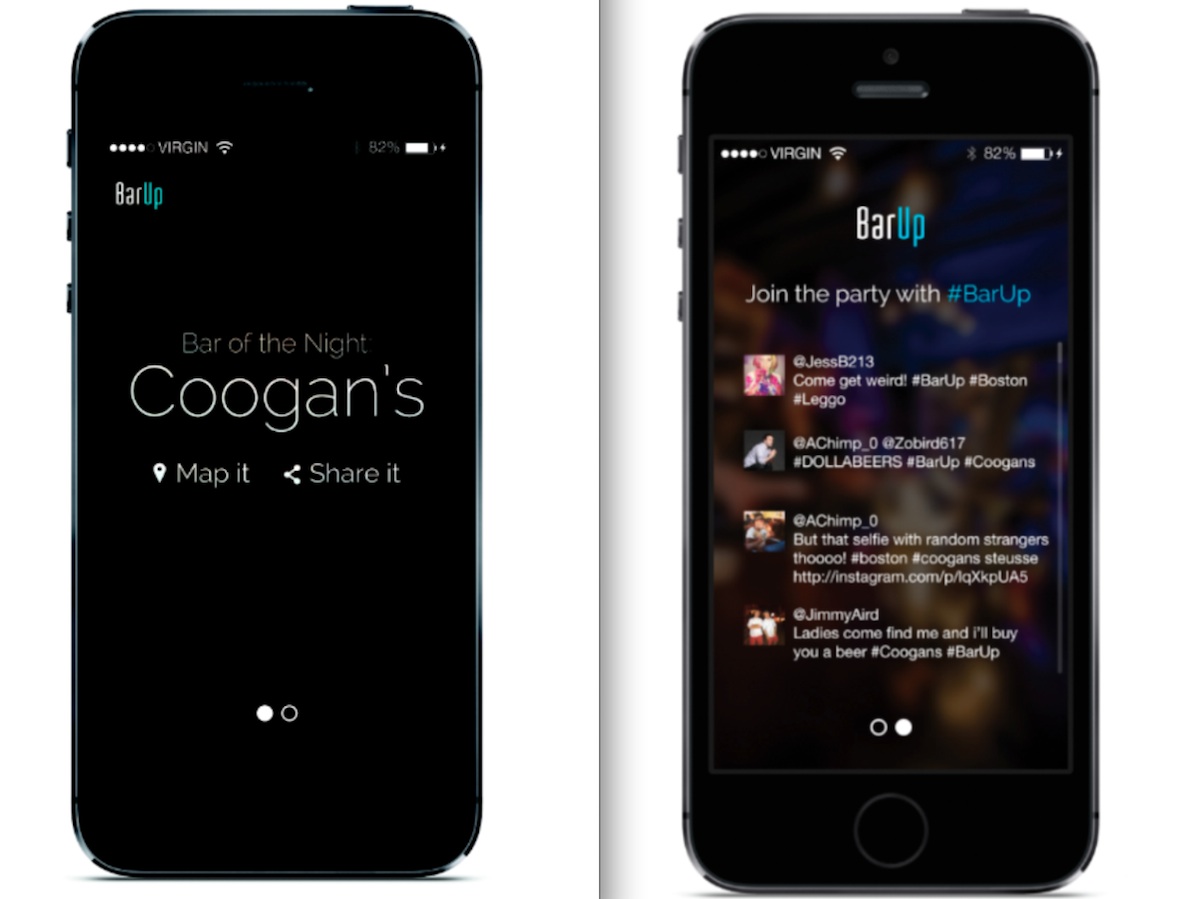BarUp App Looks to Change the Weekly Nightlife Scene in Boston

images courtesy of barup
The premise behind a new app that aims to bring bar-goers together during weeknights can be summed up in three words: “keep it simple.”
“We don’t want to add too many things to it at this point; we have a ton of ideas in our minds that we could integrate into the app, but for now, we don’t want to throw in features prematurely,” said Alex Chin, one of the cofounders of BarUp, which launches officially in Boston on August 28.
BarUp may be simple in terms of its current capabilities, but the power it wields could significantly improve peoples’ experiences when they go out during the workweek.
There are two main functions that are programmed into BarUp: first, push notifications tell users which establishment to go to each night, so that instead of people scouring the city, walking from place to place trying to find a bar that’s packed, the app gathers users together creating a nightlife of its own.
“The motivation behind this was to basically crowdsource and get everyone at one bar together, and create a real weekend feel during a weeknight. We wanted to bring the Boston community together to create that feel,” said Chin.
There are no tricky algorithms, hidden sensors that count heads at a bar, or other fancy logic behind the app either. It’s simply the creators choosing “the bar of the night” to corral people to one set location.
“There’s no real science to it. If we get a good following and enough downloads, we will be able to send people to bars where other people are hanging out,” said cofounder Jimmy Aird. “If people want to go out and use it, then we can decide what happens and we have control of the nightlife scene during the week.”
The second aspect of BarUp also has a community-driven purpose, the creators said.
Chin and Aird—both Boston residents—said users can access Twitter directly through BarUp, allowing them to both communicate with others congregating at the “bar of the night,” and scope the scene before even leaving the house or the office. When a tweet is sent through the app, it automatically includes the hashtag #BarUp.
“The impact on Twitter is directly connected to how this can spread through Boston,” said Aird.
Chin and Aird first came up with the concept for BarUp when they worked together at a tech startup. They found when they left the office for a drink during the week, people were spread out all around the city, leaving barstools mostly empty and the nightlife as stale as the beer stuck to pub floors.
“We really just wanted to go out and have fun after work, but on a Tuesday or Wednesday night we had a tough time finding a good bar for that,” said Chin.
Aird added: “the nightlife scene during the week is just horrible.”
After strategizing a bit, the duo later brought three more people to the BarUp team to expand their idea: Brett Cooke, a programmer and former coder for Nanigans; Enzo Capasso, a Bentley grad and strategic planner forging alliances with local bars; and a behind-the-scenes graphic designer.
On August 28, BarUp will celebrate its official Boston launch during a kick-off party sponsored by Magic Hat. The event, which will include giveaways and Magic Hat’s traveling “Dream Machine” van, will be held at The Point on Hanover Street.
Although they have yet to roll out their app, BarUp has already built a loyal following on Facebook and Twitter, and more than 900 people have signed up to download the app once it’s available.
The app also gained momentum with the help of @OnlyInBos, who has been teasing the release leading up to the August shindig.
Chin and Aird said they have also been in touch with a lot of bar owners in Boston who have been receptive to them leading people to their barstools after work. As the business grows, they envision entering into more formal partnerships with those bars to push promotions and host larger events, including virtual bar crawls.
But for now, it’s all about bringing people into one room to create a more vibrant experience. “What we are trying to do is build a community, and once we have that community behind us, then we can kind of look at how we can get revenue from this,” said Aird. “But right now it’s more of a social experiment.”

